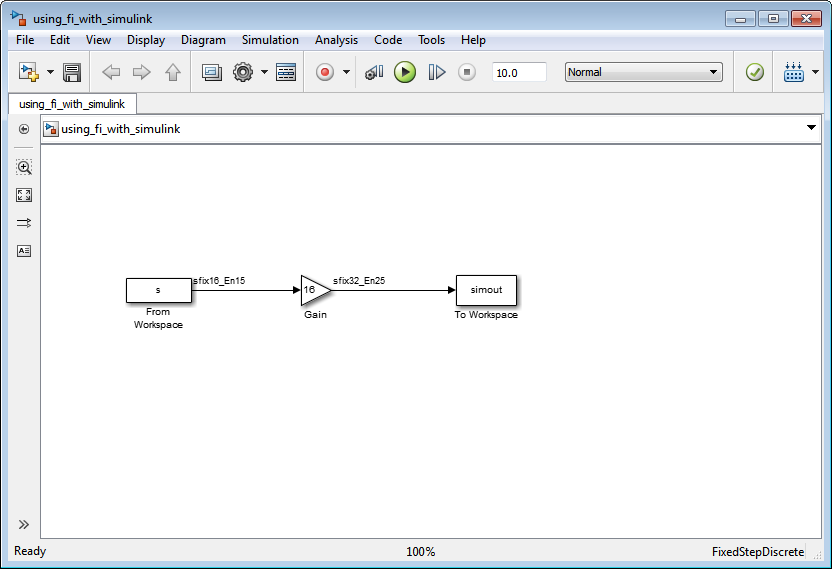fi Objects with Simulink
View and Edit fi objects in Model Explorer
You can view and edit fi objects and their local
fimath properties using Model Explorer in Simulink®. You can change the writable properties of fi
objects from the Model Explorer, but you cannot change the numeric type properties
of fi objects after creation.

Reading Fixed-Point Data from the Workspace
You can read fixed-point data from the MATLAB® workspace into a Simulink model via the From Workspace block. To do so, the
data must be in a structure format with a fi object in the
values field. In array format, the From Workspace block only
accepts real, double-precision data.
To read in fi data, the Interpolate data
parameter of the From Workspace block must not be selected, and the
Form output after final data value by parameter must be set
to anything other than Extrapolation.
Writing Fixed-Point Data to the Workspace
You can write fixed-point output from a model to the MATLAB workspace via the To Workspace block in either array or structure format. Fixed-point data written by a To Workspace block to the workspace in structure format can be read back into a Simulink model in structure format by a From Workspace block.
Note
To write fixed-point data to the MATLAB workspace as a fi object, select the
Log fixed-point data as a fi object check box on the
To Workspace block dialog box. Otherwise, fixed-point data is
converted to double and written to the workspace as
double.
For example, you can use the following code to create a structure in the
MATLAB workspace with a fi object in the
values field. You can then use the From Workspace block to
bring the data into a Simulink model.
a = fi([sin(0:10)' sin(10:-1:0)'])
a =
0 -0.5440
0.8415 0.4121
0.9093 0.9893
0.1411 0.6570
-0.7568 -0.2794
-0.9589 -0.9589
-0.2794 -0.7568
0.6570 0.1411
0.9893 0.9093
0.4121 0.8415
-0.5440 0
DataTypeMode: Fixed-point: binary point scaling
Signedness: Signed
WordLength: 16
FractionLength: 15
s.signals.values = a
s =
signals: [1x1 struct]
s.signals.dimensions = 2
s =
signals: [1x1 struct]
s.time = [0:10]'
s =
signals: [1x1 struct]
time: [11x1 double]
The From Workspace block in the following model has the
fi structure s in the
Data parameter.
Remember, to write fixed-point data to the MATLAB workspace as a fi object, select the Log
fixed-point data as a fi object check box on the To
Workspace block dialog box. Otherwise, fixed-point data is converted to
double and written to the workspace as
double.
In the model, the following parameters in the Solver pane of the Model Configuration Parameters dialog box have the indicated settings:
Start time —
0.0Stop time —
10.0Type —
Fixed-stepSolver —
Discrete (no continuous states)Fixed step size (fundamental sample time) —
1.0
The To Workspace block writes the result of the simulation to the MATLAB workspace as a fi structure.
simout.signals.values
ans =
0 -8.7041
13.4634 6.5938
14.5488 15.8296
2.2578 10.5117
-12.1089 -4.4707
-15.3428 -15.3428
-4.4707 -12.1089
10.5117 2.2578
15.8296 14.5488
6.5938 13.4634
-8.7041 0
DataTypeMode: Fixed-point: binary point scaling
Signedness: Signed
WordLength: 32
FractionLength: 25
Setting the Value and Data Type of Block Parameters
You can use Fixed-Point Designer™ expressions to specify the value and data type of block parameters in Simulink. For more information, see Specify Fixed-Point Data Types.
Logging Fixed-Point Signals
When fixed-point signals are logged to the MATLAB workspace via signal logging, they are always logged as
fi objects.
To enable signal logging for a signal:
Select the signal.
Open the Record drop-down.
Select Log/Unlog Selected Signals.
For more information, refer to Save Signal Data Using Signal Logging.
When you log signals from a referenced model or Stateflow® chart in your model, the word lengths of fi objects
may be larger than you expect. The word lengths of fixed-point signals in referenced
models and Stateflow charts are logged as the next largest data storage container
size.
Accessing Fixed-Point Block Data During Simulation
Simulink provides an application program interface (API) that enables
programmatic access to block data, such as block inputs and outputs, parameters,
states, and work vectors, while a simulation is running. You can use this interface
to develop MATLAB programs capable of accessing block data while a simulation is running
or to access the data from the MATLAB command line. Fixed-point signal information is returned to you via
this API as fi objects. For more information on the API, refer to
“Accessing Block Data During Simulation” in the Simulink documentation.